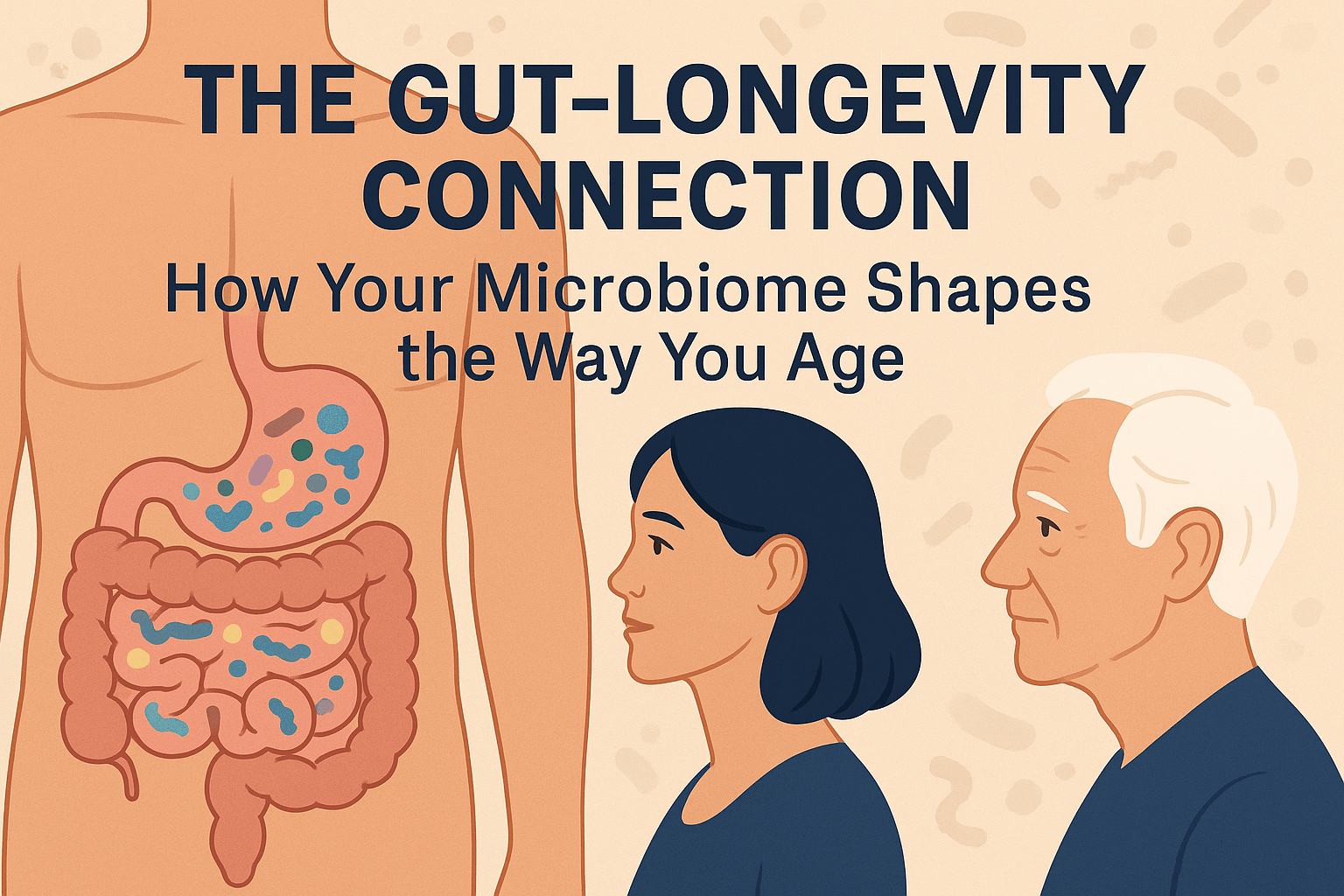
The Gut-Longevity Connection: How Your Microbiome Shapes the Way You Age
Discover how your gut microbiome influences aging, immunity, and inflammation. Learn why testing your gut health is key to living longer—and better.
Introduction
Aging is an inevitable process, but the rate and quality of aging can vary significantly among individuals. Recent scientific advancements have illuminated the profound influence of the gut microbiome—a complex community of trillions of microorganisms residing in our digestive tract—on the aging process. Understanding this connection opens new avenues for promoting healthy aging and longevity.
The Gut Microbiome: An Overview
The gut microbiome comprises bacteria, viruses, fungi, and other microorganisms that play crucial roles in digestion, immune function, and overall health. Its composition is dynamic, influenced by factors such as diet, lifestyle, medications, and age.
Age-Related Changes in the Gut Microbiome
As we age, the diversity and stability of the gut microbiome tend to decline, a phenomenon associated with various age-related diseases. Studies have shown that older adults often exhibit reduced microbial diversity and an imbalance in beneficial and harmful bacteria, leading to increased inflammation and susceptibility to infections.
Centenarians and the Youthful Microbiome
Intriguingly, research on centenarians—individuals who live to 100 years or more—reveals that they often maintain a gut microbiome resembling that of much younger individuals. A study involving 1,575 individuals aged 20 to 117 found that centenarians had a higher abundance of beneficial bacteria such as Bacteroides and a more balanced microbial community, suggesting a link between microbiome composition and exceptional longevity .
Beneficial Microbes Associated with Healthy Aging
Several bacterial species have been identified as contributors to healthy aging:
-
Akkermansia muciniphila: This bacterium supports the gut lining and modulates immune responses. Its presence is associated with reduced inflammation and improved metabolic health .
-
Faecalibacterium prausnitzii: Known for its anti-inflammatory properties, this species produces butyrate, a short-chain fatty acid (SCFA) that nourishes colon cells and maintains gut integrity .
-
Christensenellaceae: Higher levels of this family have been linked to lower body mass index (BMI) and a reduced risk of frailty in the elderly .
The Role of Short-Chain Fatty Acids (SCFAs)
SCFAs, including butyrate, propionate, and acetate, are metabolites produced by gut bacteria during the fermentation of dietary fibers. They play vital roles in:
-
Maintaining Gut Barrier Function: SCFAs strengthen the intestinal lining, preventing the translocation of harmful pathogens.
-
Modulating Immune Responses: They help regulate inflammation, a key factor in aging and age-related diseases.
-
Supporting Metabolic Health: SCFAs influence glucose and lipid metabolism, contributing to energy homeostasis .
Dysbiosis and Its Implications
An imbalance in the gut microbiome, known as dysbiosis, can lead to increased gut permeability, systemic inflammation, and a higher risk of chronic diseases such as obesity, diabetes, and neurodegenerative disorders . Addressing dysbiosis is crucial for promoting healthy aging.
Lifestyle Factors Influencing the Gut Microbiome
Several modifiable lifestyle factors can positively impact the gut microbiome:
-
Diet: Consuming a diverse range of plant-based foods rich in fibers supports microbial diversity. Fermented foods like yogurt and kefir introduce beneficial probiotics .
-
Exercise: Regular physical activity has been shown to enhance microbial diversity and promote the growth of beneficial bacteria .
-
Sleep and Stress Management: Adequate sleep and stress reduction techniques help maintain a balanced gut microbiome.
Gut Microbiome Testing: A Tool for Personalized Interventions
Advancements in microbiome testing allow for the analysis of an individual's gut microbial composition. This information can guide personalized dietary and lifestyle interventions aimed at restoring balance and promoting healthy aging.
Conclusion
The gut microbiome plays a pivotal role in the aging process. By understanding and modulating our gut health through diet, lifestyle, and potentially microbiome testing, we can influence our trajectory of aging, aiming for a longer, healthier life.

